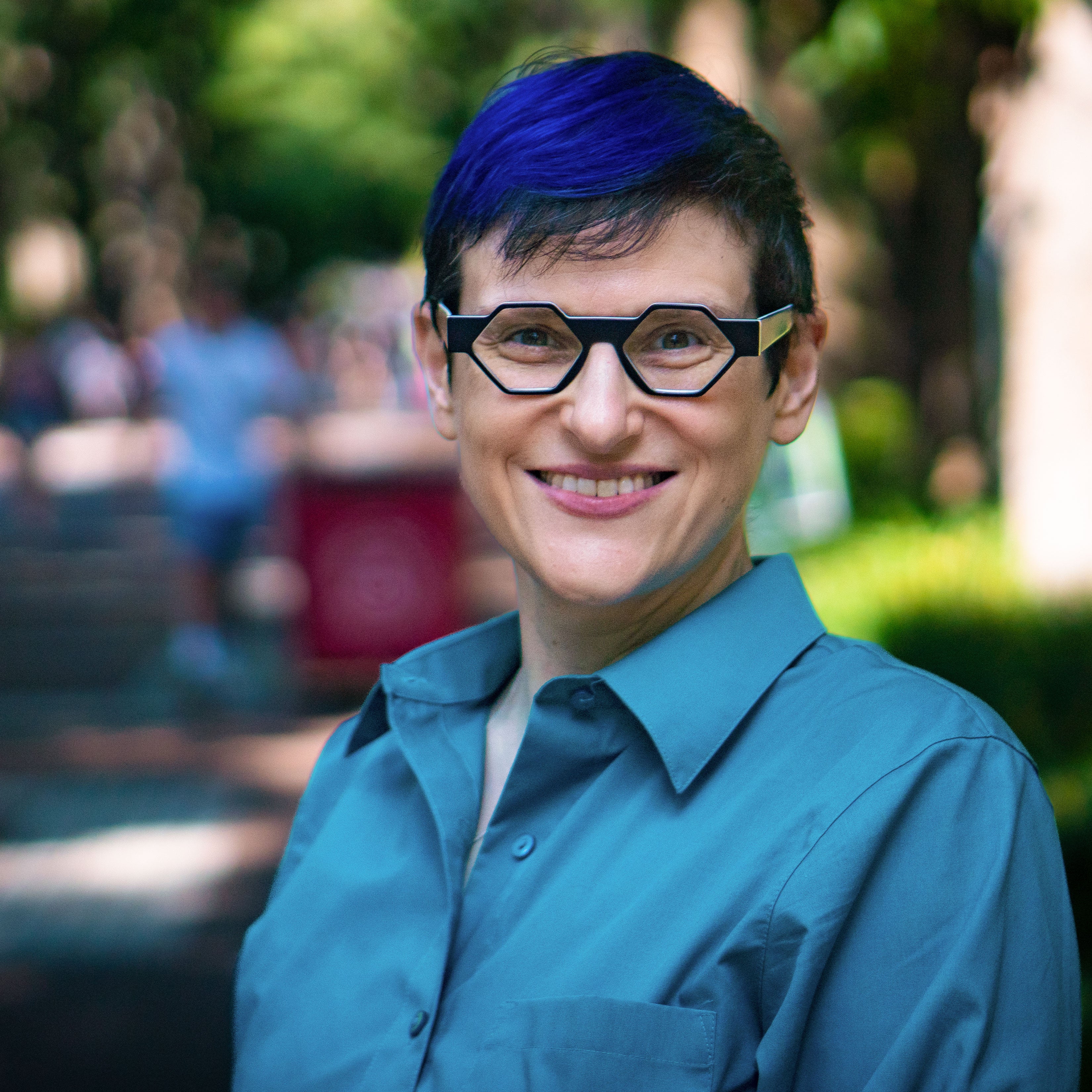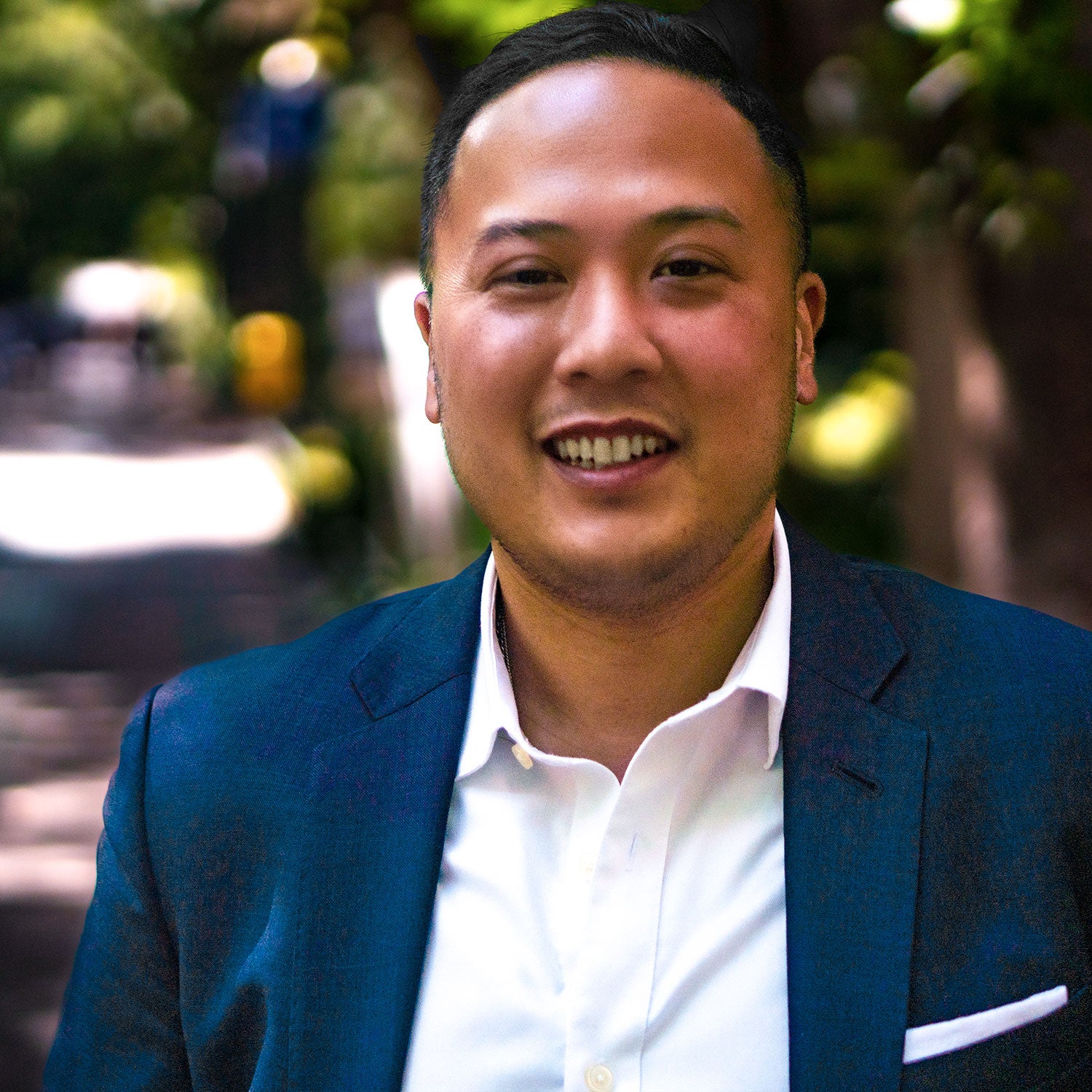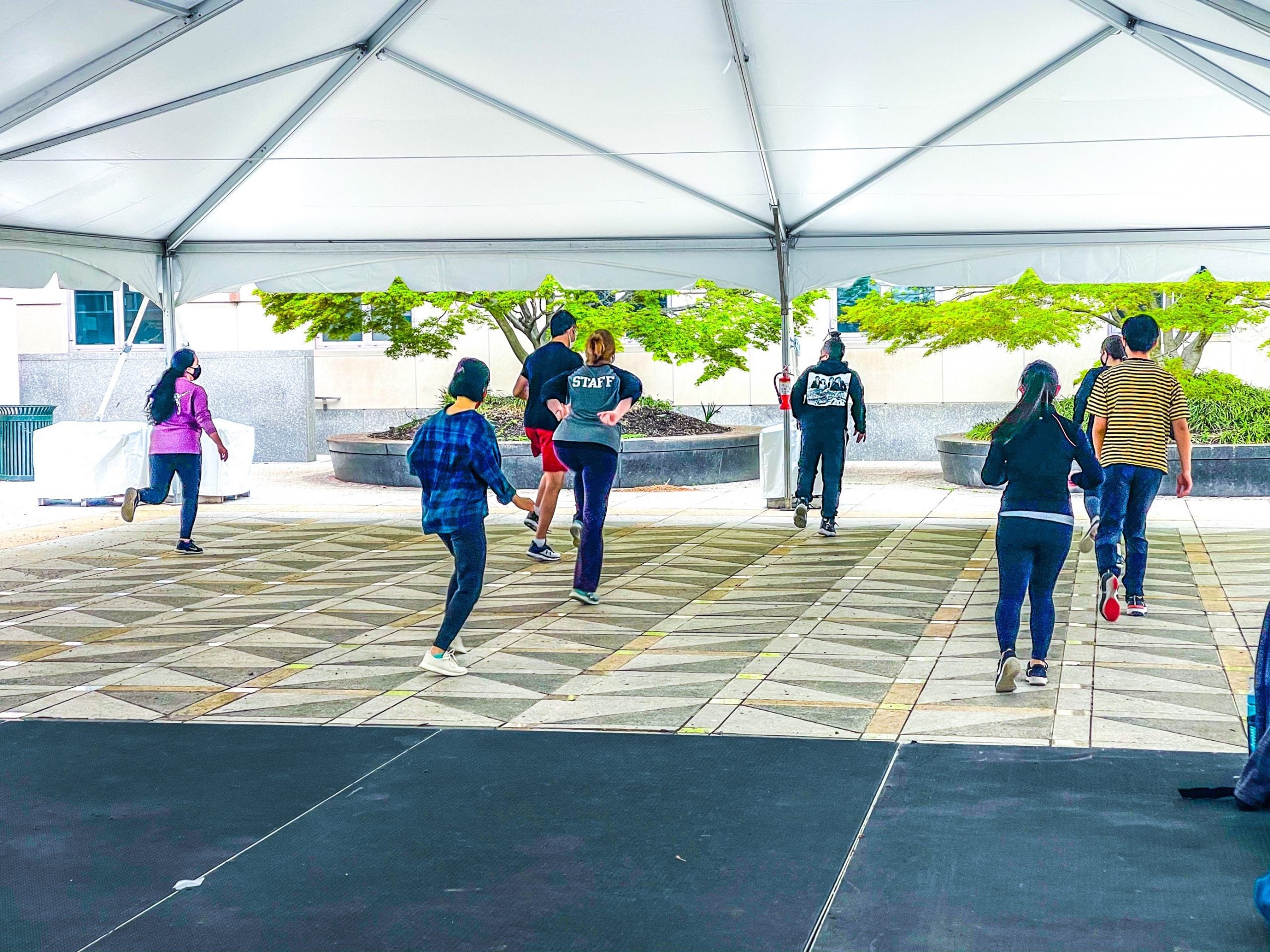Penn Student Magazine La Vida
Student at La Casa Latina and across campus celebrated the launch of La Vida magazine, a student run magazine about the Latinx community.
Director of La Casa Latina, Krista Cortes centers Blackness and celebrates the multiplicity inherent in ‘Latinidades.’
Walking into Krista L. Cortes’ home, visitors might be hit by the smell of sofrito, that cornerstone of Caribbean cooking, and see her children helping in the kitchen. “Sofrito is like a labor of love; it takes a lot of time,” Cortes says. “And since my oldest son was about 2 years old, he’s always helped me.” The food she makes for her family—plantains, rice and beans—helps connect them to their culture. For Puerto Rican Cortes and her Cuban husband, rooting their children in Afro-Latinx identity also means having bilingual and Spanish-language books, watching movies with Black protagonists, and having pictures of family, “which runs the gamut in color,” Cortes says, as well as artwork featuring orishas hung on the walls. Cortes and her husband practice Santería and the orishas are important intermediaries between humanity and divinity. “You walk into my house and the first thing you see are guerreros [warriors]: Eleggúa, Oggún, or Ochosi. That, to me, is an artifact of our Blackness.”
Cortes, who earned two master’s degrees from Penn’s Graduate School of Education and a Ph.D. in education from the University of California, Berkeley, is bringing this sense of Blackness home to La Casa Latina, one of six cultural resource centers at Penn. Cortes uses the term “Latinidades,” instead of the traditional “Latinidad,” to refer to the plurality inherent in all the different people, cultures, races, and languages that comprise Latin heritage. It’s not just one thing, she says, and in America that often gets lost in translation.
“There’s a white-washing of Latinidad that happens in popular media. One of the opportunities to counter this is within the university setting. For the 10th annual Dolores de la Huerta lecture, Cortes invited two Haitian women, Maika and Maritza Moulite, to present. That was intentional. We love to talk about Latin America and the Caribbean and think about the Caribbean in its entirety when it suits us, but non-Spanish-speaking countries often get left out. People forget that Haiti and the Dominican Republic are actually one island; two countries share that space.Inviting Haitian speakers was a way that I’m trying to show folks that this is an issue that’s important to the Latinx community.”
Hey Day 2021
Event Registration
As part of the University’s community care efforts, all student groups must register social events they would like to host on campus, at an off-campus residence, or at a third-party venue. This includes all events where alcohol will be served as well as dry events. All Penn community members are expected to review The University Alcohol and Other Drug Policy.
Registering events with alcohol
All members of the Penn student community, undergraduate, graduate, or professional, are expected to follow University policies and local, state, and federal laws at all times. These expectations extend to all event hosting, whether in on-campus spaces (such as fraternity houses or Houston Hall), off-campus residences, or third-party venues (such as restaurants or clubs).
All student organizations are required to register social events with alcohol, regardless of where the event will be held. Registration helps student groups manage risk, since registered events require hosts to provide bartenders and security. Student group leaders should submit the registration materials and await response from University Life and/or an advisor (if applicable). Student groups should not publicize any event until they have received formal confirmation from University Life.
Drinking contests or games of any sort are expressly prohibited.
Many University undergraduate student organizations are subject to policies regarding the possession and consumption of alcohol imposed by a parent organization. If the policies governing an individual organization impose more restrictive regulations regarding alcohol possession and consumption it will be necessary for that organization to follow its parent organization’s policies or risk sanctions. If, however, the parent organization permits the possession or consumption of alcohol where otherwise prohibited by University policy, the organization must comply with the University’s policy, notwithstanding its parent organization’s rules.
Costs associated with hosting events with alcohol
Student groups hosting events where alcohol is served must have professional bartenders serving at the bar and professional security checking IDs at the front door. Funding is available to all undergraduate and graduate student groups to assist with the cost of these services. All student groups will have these costs automatically subsidized for up to four (4) events per semester. There is no separate application process to receive funds; University Life will book and pay for these services for events cleared to move forward.
After those four events, student groups are responsible for the costs of bartenders and security where applicable. Hosting a registered event with alcohol can range in cost from approximately $500 – $850 (some events could cost less; others might cost more). This depends upon various factors such as the length of the event, the time of day, the number of staff, etc. Please contact Emily Giffin, Program Coordinator for Community Care, with any questions.
Registering events without alcohol
Student organizations wishing to hold social events without alcohol are required to register with University Life, regardless of whether the event will be held in an on-campus fraternity house, off-campus residence, or third-party venue. Registration of these events helps Event Observers and Penn Police identify and differentiate between activity each weekend. Student group leaders should submit the registration materials and await response from University Life and/or an advisor (if applicable). Student groups should not publicize any event until they have received formal confirmation from University Life.
Keep in mind…
- No registered events may be held in basements, whether in on-campus or off-campus residences. Organizations may hold chapter-based activities and internal house gatherings in basement spaces, but for safety concerns, events must be held on the first floor if a larger group made up of non-members are attending.
- Organizations such as athletic teams or performing arts groups may be subject to additional expectations by coaches, advisors, or sponsors.
- Organizations that live in, and host events at, private off-campus residences are subject to additional expectations set forth in rental agreements/leases and in personal communications with landlords.
- Social fraternities at Penn belong to the IGC and IFC Councils. All NIC (North American Interfraternity Conference) and/or IFC-member fraternities follow the NIC Standard Operating Procedures to enhance safety measures at events. Some of these include:
- The presence of alcohol products above 15% alcohol by volume (ABV) (“hard alcohol”) is prohibited on any chapter/organization premises or at any event, except served by a licensed and insured third-party venue
- Events with alcohol are limited to a 3:1 maximum guest-to-member ratio, meaning the total attendance must not be greater than three times the chapter’s total active membership. For all events, attendance must not exceed the local fire or building code capacity of the host venue.
- Attendance by non-members at any event where alcohol is present must be by invitation only, and the organization must utilize a guest list system.
Register your event
UPDATE (5/11/22): Event registration is closed until the 2022 fall term. Thank you!
- If you are Penn staff/faculty and are in need of bartending services for an upcoming event, please email Emily Giffin directly, and she can provide assistance.
Beginning in Fall 2022, please submit the appropriate event registration form based upon where you plan to host your social event—on campus or at an off-campus residence (blue button) or at a third-party venue (red button). If you’ll be hosting a dry social event with no alcohol, access the appropriate form via the gray button. Note: dry events taking place at third-party venues should still register by clicking the red button and completing our third-party venue form.
Groups should submit their registration for an event with alcohol two weeks prior to the event date. For dry events, registration should be submitted one week before the event date.
Contact Information
If you have any questions about the event registration process, please reach out to Emily Giffin, Program Coordinator for Community Care.
Penn announces plans for new student performing arts center
Penn President Amy Gutmann today announced that the University has begun the planning process to build a new student performing arts center at 33rd Street and Woodland Walk, adjacent to Lauder and Hill College Houses and proximate to King’s Court English College House. The University has issued a request for a proposal for a feasibility study for the proposed $31-million, 36,000-square-foot center, a project which Gutmann said has been in high demand by the collective undergraduate student body.
Founder of Penn LGBT Center Bob Schoenberg dies at 76
Founder and long-time Director of the Penn LGBT Center Bob Schoenberg died suddenly on Monday from cancer.
Schoenberg — who received a master of social work and a doctor of social work from the School of Social Policy & Practice in 1968 and 1989, respectively — founded the LGBT Center in 1982 after witnessing a Penn sophomore being severely beaten and targeted on Locust Walk for being gay. He served as the LGBT Center’s director for 35 years until retiring in 2017.
Schoenberg was born in Erie, Pennsylvania, in 1944 and died at a residential hospice in Wyndmoor, Pennsylvania, according to his obituary.
According to the LGBT Center website, while Schoenberg was a doctoral student at Penn, he was hired to work three days per week as a “point person for lesbian and gay student concerns.” He was the second person in the country to have such responsibilities at a college or university, his obituary reads.
University staff reflect on assisting LGBTQ college students during pandemic
Due to the COVID-19 pandemic, college students have had to live their lives a little differently than initially planned. This includes taking online classes and not engaging with that same sense of camaraderie they would have felt if they attended college in person.
Many LGBTQ students, in particular, felt a specific form of isolation. But how did campus staff members assist these students? PGN spoke with representatives from departments specializing in diversity and inclusion at Drexel University and University of Pennsylvania on how students felt, what the staff did to combat these issues, and how they plan to move forward.
Erin Cross, the director for UPenn’s Lesbian Gay Bisexual Transgender Center, noted the impact of financial issues on transgender and gender-nonconforming students. She said there was a huge uptick in students who applied for UPenn’s Townsend Munro Fund, which assists students making gender transitions. She noted that a high number of students applied for it during the pandemic as they now had to pay for food and rent in addition to medical supplies and other things necessary for transition.

Penn community honors victims of mass shootings at vigil
On Tuesday night, about 50 Penn students gathered on College Green for a candlelight vigil commemorating victims of recent acts of gun violence.
The vigil was organized by Penn Democrats, the Pan-Asian American Community House, the Spiritual and Religious Life Center, and Amnesty International at Penn, and featured City Councilmember and Penn alumna Jamie Gauthier, along with a number of community leaders. Speakers shared their thoughts regarding the recent shootings, particularly the March 16 Atlanta spa shootings that killed eight people, including six women of Asian descent, the March 22 Colorado grocery store shooting that killed 10 people, and the April 15 Indianapolis FedEx shooting that killed eight people, including four people from the area’s Sikh community.
The Indianapolis attack was at least the 50th mass shooting — defined as having four or more casualties excluding the shooter — in the United States since the Atlanta shootings.
He added that anti-Asian violence is made possible due to “anti-Blackness and anti-Indigeneity.”
Throughout the vigil, attendees and speakers wore solemn faces, with some tearing up.
College first year Mira Sydow, a Penn Dems member and the main organizer of the event, told The Daily Pennsylvanian that their goal in organizing the vigil was to offer support to the Penn community.
“Even one person showing up and feeling a bit better and feeling like they are supported in this community would have been enough,” Sydow said. “Seeing that we got as many people as we did and that we were all so touched by the remarks from the speakers is incredible.”
Growing up in the suburbs of Atlanta, Sydow explained that she was very involved with Atlanta’s Asian American community and local activists last semester when she was mobilizing Asian American voters for the January runoff elections for U.S. Senate.
How to engage academic wellness services
I’m here to tap into my full potential,” says Niko Simpkins, a junior majoring in mechanical engineering. “That’s the quote that I live by.” Simpkins envisions excellence, which is why he found himself at the Weingarten Center, poring over past exams with STEM learning specialist Gabriel Angrand. Weingarten is Penn’s hub for tutoring, disabilities services, and academic supports for undergraduate, graduate, and professional students across all 12 schools. Weingarten staff collaborate with campus partners including Academic Advising, Athletics, Counseling & Psychological Services, International Student and Scholar Services, and Penn First Plus.
Weingarten looks at student wellness comprehensively, says associate vice provost Sharon Smith. “So, if a student is with us in tutoring and it turns out they are struggling with concentration, we have the resources and expertise to help them with that within Weingarten,” she says. The goal, she says, is to provide multidisciplinary case management and connect students directly with the help they need.
Weingarten Center by the Numbers [Fall 2020]
Students Engage with Philadelphia
Monday, April 12 had neither course assessments nor asynchronous classes. The University offered self-directed activities that advanced our community, both to engage with Philadelphia for our Year of Civic Engagement and to explore opportunities and faculty expertise at Penn, including asynchronous preceptorials and other events with campus organizations.















